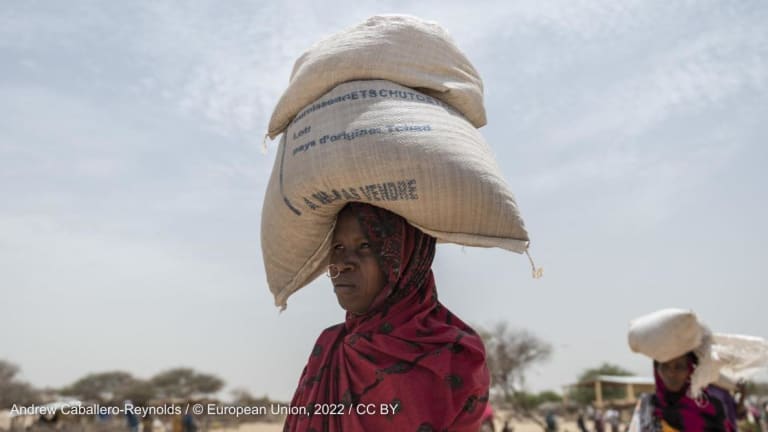DfID-Somalia Partnership
Fearing that instability in Somalia could spread to neighboring countries and incite regional extremism, security is the top priority of the international community and the United Kingdom. The U.K. Department for International Development is working to address some of the underlying causes of instability by providing official development assistance.
Somalia is often referred to as the world’s most fragile state. Despite the recent military success by the government, African Union and Kenyan forces, large parts of the region continue to be under Islamic control. More than two decades of conflict and the absence of a functioning national government have left the country with some of the world’s most depressed development and humanitarian indicators. According to the U.N. High Commissioner for Refugees, out of a population of approximately 9.3 million, 1.36 million Somalis are internally displaced and more than 43 percent live on under $1 per day. Unemployment in Somalia is above 60 percent. Further, the East Africa famine of 2011, the worst in 60 years, affected 2.3 million people, many of which remain vulnerable today. After eight years of a largely ineffectual Transitional Federal Government, Somalia’s first formal parliament and president in more than 20 years were inaugurated in September 2012. While political uncertainty prevails, there are glimmers of hope that Somalia will achieve a peaceful political transition that ushers in a period of relative stability. Fearing that instability in Somalia could spread to neighboring countries such as Kenya, Ethiopia and Uganda and incite regional extremism, security is the top priority of the international community and the United Kingdom. The U.K. Department for International Development is working to address some of the underlying causes of instability by providing official development assistance through its country office in Nairobi, Kenya, and a small Somalia Unit located in London. Funding levels Somalia is the single largest beneficiary of DFID’s aid review of 2011, with funding levels planned to rise to nearly 300 million pounds ($480 million), an increase of 208 percent, between 2010 and 2015. The majority of DFID aid is being distributed through a range of third-party implementers, including the United Nations and nongovernmental organizations that operate effectively on the ground. DFID is also aiming to diversify this portfolio by allotting more funds to private contractors. In the future and subject to strong financial controls, the agency is considering channelling funds directly to the post-transition government. Funding priorities Engagement in Somalia is fundamentally aligned with the U.K. strategy for Somalia and the Strategic Defence and Security Review, addressing the key priorities of Britain’s National Security Council. Aiming to resolve the underlying causes for violence and conflict, DFID funding to Somalia is based on four priority areas: 1) Wealth Creation; 2) Governance and Security; 3) Reproductive, Maternal and New-born health; and 4) Humanitarian assistance. DFID’s two largest operational programs are the Somalia Humanitarian Interventions 2011 (57.8 million pounds) and the 2012 Humanitarian Interventions (48 million pounds). Both programs are part of DFID’s 200 million pounds Humanitarian Emergency Response to the 2011 famine and additional assistance beyond the planned expenditure under the Operational Plan 2011-2015. Geographically, more than 40 percent of all aid activities take place in relatively stable Somaliland, where development assistance seems most effective. DFID’s work in the region focuses particularly on wealth creation, health, governance and security. The South Central zone, the most conflict-affected and famine-stricken area in the country, receives the majority of DFID’s humanitarian assistance. While the agency funded education programs before 2012, it has since ended this support as part of an agreed division of labor with the European Union. Devex analysis Evidenced by a string of high-profile visits and diplomatic activity, Somalia is a top priority country of U.K. foreign policy. In early 2012, U.K. Foreign Secretary William Hague paid the country a historic visit — the first of a U.K. foreign secretary in more than 20 years — followed by the re-establishment of a diplomatic presence through the appointment of Ambassador Matt Baught. In February 2012, the United Kingdom organized the London Conference on Somalia and as recently as October 2012, the newly appointed Secretary of State for International Development Justine Greening visited Somalia. Somalia is one of the world’s most difficult environments for aid and development workers. War, violence and the absence of a functioning central authority, particularly in the southern part of the country, have left the aid community struggling to operate among formal and informal nodes of authority. The absence of a DFID office in Somalia adds to the various project implementation and monitoring constraints that affect the Department and its partners. DFID is expected to expand its humanitarian activities, 80 percent of which are concentrated on the South-Central region. The United Kingdom is among the top providers of emergency funds to Somalia in 2011. Bolstering recent military and political success, DFID’s spending on government and security will triple by 2013 with the goal of building a more stable environment for development assistance, peace, and growth. In addition, Greening recently outlined 38.3 million pounds in aid package to new Somali President Hassan Sheikh Mohamud aimed at further strengthening the fragile government. Devex expects U.K. assistance to Somalia to increase further and extend substantially beyond the current operational plan ending in 2015. Contacts: DFID Kenya and Somalia British High Commission Upper Hill Road, P.O. Box 30465 Nairobi Kenya Tel.: (254-20) 287-3000Fax: (254-20) 287-3102
Somalia is often referred to as the world’s most fragile state. Despite the recent military success by the government, African Union and Kenyan forces, large parts of the region continue to be under Islamic control. More than two decades of conflict and the absence of a functioning national government have left the country with some of the world’s most depressed development and humanitarian indicators. According to the U.N. High Commissioner for Refugees, out of a population of approximately 9.3 million, 1.36 million Somalis are internally displaced and more than 43 percent live on under $1 per day. Unemployment in Somalia is above 60 percent. Further, the East Africa famine of 2011, the worst in 60 years, affected 2.3 million people, many of which remain vulnerable today.
After eight years of a largely ineffectual Transitional Federal Government, Somalia’s first formal parliament and president in more than 20 years were inaugurated in September 2012. While political uncertainty prevails, there are glimmers of hope that Somalia will achieve a peaceful political transition that ushers in a period of relative stability.
Fearing that instability in Somalia could spread to neighboring countries such as Kenya, Ethiopia and Uganda and incite regional extremism, security is the top priority of the international community and the United Kingdom. The U.K. Department for International Development is working to address some of the underlying causes of instability by providing official development assistance through its country office in Nairobi, Kenya, and a small Somalia Unit located in London.
This story is forDevex Promembers
Unlock this story now with a 15-day free trial of Devex Pro.
With a Devex Pro subscription you'll get access to deeper analysis and exclusive insights from our reporters and analysts.
Start my free trialRequest a group subscription Printing articles to share with others is a breach of our terms and conditions and copyright policy. Please use the sharing options on the left side of the article. Devex Pro members may share up to 10 articles per month using the Pro share tool ( ).
Thanks a lot for your interest in Devex News. To share news and views, story ideas and press releases, please email editor@devex.com. We look forward to hearing from you.




